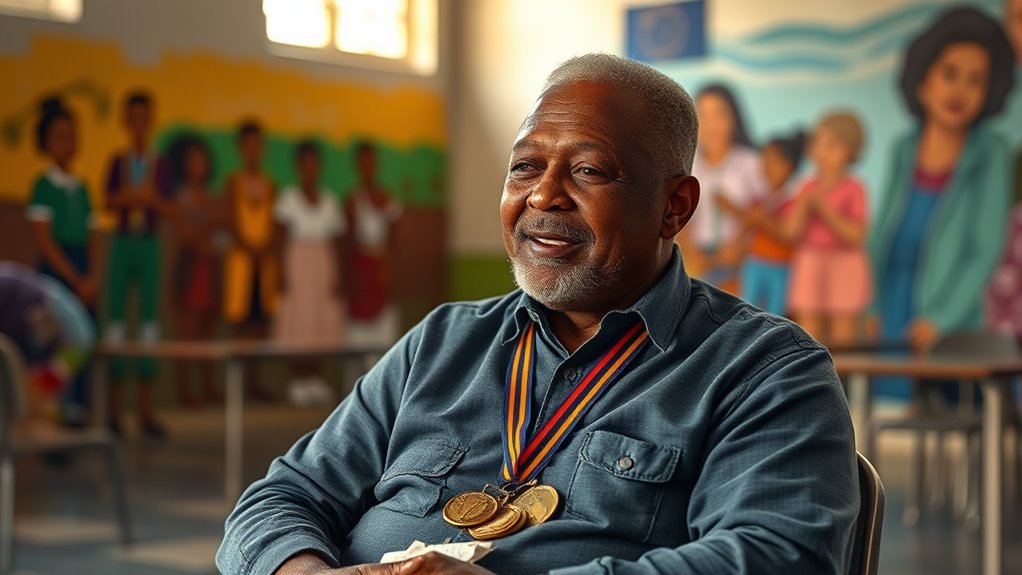If you’re seeking inspiration, exploring six key biographies can really open your eyes to true leadership. Stories of Greg Mortenson’s fall from grace highlight the importance of integrity and transparency. Acharya Vinoba Bhave’s selfless dedication teaches the power of moral commitment. Dietrich Bonhoeffer and Hans von Dohnanyi inspire with their moral courage against evil. Others showcase resilience, innovation, and enduring influence, revealing how authentic purpose transforms societies. Keep exploring these stories, and you’ll discover lessons that will change how you see leadership forever.
Key Takeaways
- Biographies of leaders like Greg Mortenson and Vinoba Bhave showcase unwavering commitment and ethical integrity in humanitarian work.
- These stories highlight personal sacrifices and resilience that redefine true leadership in challenging environments.
- Learning from transformational figures inspires collective action, moral courage, and innovative approaches in humanitarian efforts.
- Cultural context and personal background deepen understanding of leaders’ motivations and strategies for societal change.
- Such biographies serve as powerful tools to challenge perceptions of leadership, emphasizing authenticity, perseverance, and social responsibility.
Three Cups of Deceit: How Greg Mortenson, Humanitarian Hero, Lost His Way

If you believe that true humanitarian leadership is built on honesty and transparency, then the story of Greg Mortenson is a crucial cautionary tale. His book, “Three Cups of Tea,” inspired many to support his mission of building schools in remote regions. But as investigations revealed, Mortenson exaggerated or fabricated many stories, including his heroics in Korphe. Financial irregularities surfaced, with funds misused for personal gain and promotional activities. The organization’s lack of transparency and accountability cast doubt on its impact. Mortenson’s fall from grace underscores the importance of verifying claims and maintaining integrity in leadership, especially when goodwill is at stake.
Best For: individuals and organizations seeking a detailed understanding of ethical pitfalls in philanthropy and nonprofit management.
Pros:
- Provides a comprehensive analysis of the importance of transparency and accountability in charitable work.
- Highlights real-world consequences of dishonesty and organizational mismanagement.
- Serves as a cautionary example to promote integrity and due diligence in humanitarian efforts.
Cons:
- Focuses primarily on the scandal, which may overshadow positive aspects of charitable missions.
- May discourage support for similar causes due to increased skepticism.
- Lacks specific guidance for implementing organizational reforms or best practices.
Acharya Vinoba Bhave Biography for Children

This article about Acharya Vinoba Bhave is perfect for children who want to learn about inspiring leaders who dedicated their lives to helping others. Vinoba Bhave was a remarkable social reformer and freedom fighter who spent his life working for justice, land reforms, and uplifting society. His selfless efforts changed countless lives and continue to inspire many today. Learning about his dedication and values helps children understand the importance of service, patriotism, and moral integrity. Sharing Vinoba Bhave’s story encourages young minds to appreciate India’s rich heritage and motivates them to follow his example of kindness and social responsibility.
Best For: children and young students interested in learning about inspiring Indian leaders who have contributed to social service and national development.
Pros:
- Provides valuable lessons on dedication, selflessness, and patriotism.
- Helps children appreciate India’s cultural heritage and history.
- Inspires moral values and social responsibility in young minds.
Cons:
- May require adult guidance for better understanding of complex social concepts.
- Could be too simplified for older children seeking detailed historical information.
- Limited focus on personal life details, emphasizing only virtues and contributions.
No Ordinary Men Book on Dietrich Bonhoeffer and Hans von Dohnanyi

For anyone interested in understanding the moral courage behind resistance against tyranny, *No Ordinary Men* offers a compelling and detailed look at the lives of Dietrich Bonhoeffer and Hans von Dohnanyi. The book vividly portrays their brave efforts to oppose Hitler from within Nazi Germany, emphasizing their moral integrity and sacrifice. Bonhoeffer, a renowned theologian, stood firm in his faith and convictions, while Dohnanyi played a critical, often overlooked role in plotting against the regime. Despite facing arrest, torture, and execution, their unwavering commitment to decency and justice shines through, inspiring us to reflect on moral courage in the face of evil.
Best For: readers interested in moral courage, resistance history, and religious reflections on standing against tyranny.
Pros:
- Offers a detailed and vivid portrayal of resistance figures Bonhoeffer and Dohnanyi.
- Combines historical facts with personal stories to deepen understanding.
- Highlights moral integrity and sacrifices made by individuals during Nazi Germany.
Cons:
- The book’s depth and detailed footnotes may be overwhelming for some readers.
- Its relatively short length might leave readers wanting more comprehensive coverage.
- Some readers may find the historical context dense or challenging to follow without prior knowledge.
Pathway to the Stars: 100 Years of the Royal Canadian Air Force

Are you enthusiastic about understanding how military aviation has shaped Canada’s history? *Pathway to the Stars: 100 Years of the Royal Canadian Air Force* is an essential read for anyone eager to explore the remarkable contributions of the RCAF, especially those interested in stories of dedication, diversity, and service. This beautifully illustrated book celebrates a century of Canadian military aviation, highlighting key moments like World War II efforts and the vital role of women in the air force. Personal stories bring history to life, showing how the RCAF’s legacy of sacrifice and innovation continues to inspire. It’s a powerful reminder of Canada’s commitment to peace and resilience.
Best For: enthusiasts of military aviation history, Canadian military personnel, and anyone interested in Canada’s contributions to global conflicts through the lens of the RCAF.
Pros:
- Comprehensive coverage of 100 years of the Royal Canadian Air Force history, including significant events like World War II.
- Richly illustrated with engaging visuals that complement the detailed narratives.
- Highlights diverse contributions, including the critical role of women, fostering an inclusive perspective.
Cons:
- Some historical details may be missing or less detailed for certain periods.
- The focus is primarily on Canadian perspectives, which might limit global context for some readers.
- As a large volume, it may be less accessible for those seeking quick overviews or brief summaries.
Citizen: My Life After the White House

If you’re inspired by leaders who dedicate their lives to service and making a global impact, “Citizen: My Life After the White House” offers a compelling look at Bill Clinton’s ongoing humanitarian efforts. After leaving office, Clinton focused on international aid, peace negotiations, and charitable work, demonstrating his unwavering commitment to improving lives worldwide. Despite facing media criticism and partisan attacks, he remains honest, humble, and deeply passionate about helping others. His story highlights that true leadership extends beyond political power, emphasizing perseverance, integrity, and a genuine desire to serve humanity. Clinton’s post-presidential journey continues to inspire those committed to making a difference.
Best For: readers interested in presidential legacies, humanitarian efforts, and inspiring leadership stories who want an insightful and detailed account of Bill Clinton’s life after the White House.
Pros:
- Provides an accessible, engaging narration of Clinton’s post-presidential humanitarian work and global impact
- Offers personal reflections and anecdotes that deepen understanding of Clinton’s character and motivations
- Includes historical context and addresses political hostility, making it relevant to current geopolitical issues
Cons:
- The length of the book may be daunting for some readers seeking a concise biography
- Some may find the narration style overly detailed or lengthy compared to other memoirs
- Critics might perceive certain sections as overly sympathetic or lacking critical analysis of some controversies
Cambodia Calling: A Memoir from the Frontlines of Humanitarian Aid

Anyone seeking a candid, behind-the-scenes look at humanitarian work in Cambodia might find “Cambodia Calling” intriguing, though it offers a mixed portrayal. I found the book’s vivid descriptions of remote villages and the challenges aid workers face compelling, but the disjointed structure confused me. The author’s focus on personal pleasures and negative views of Cambodia overshadow genuine insights. His lack of empathy and superficial storytelling diminish the book’s impact, making it feel more like an adventure novel than a meaningful account of aid work. For those interested in authentic humanitarian experiences, this memoir may fall short of expectations.
Best For: readers interested in an entertaining, superficial account of humanitarian work with a focus on personal experiences rather than deep cultural or humanitarian insights.
Pros:
- Vivid descriptions of remote Cambodian villages and local challenges.
- Engaging storytelling with humor and lyrical phrasing at times.
- Offers a behind-the-scenes glimpse into the daily life of aid workers.
Cons:
- Disjointed structure that hampers overall coherence and understanding.
- Lacks genuine empathy and depth, appearing self-centered and superficial.
- Criticized for bland writing, negative portrayal of Cambodia, and limited meaningful insights.
Factors to Consider When Choosing Humanitarian Leader Biographies

When selecting humanitarian leader biographies, I focus on the authenticity of their stories and how their leadership style influences change. I also consider the impact they’ve made on organizations and the cultural relevance of their experiences. Personal sacrifices they’ve made often reveal their true commitment and resilience.
Authenticity of Stories
How can we be sure that a humanitarian leader’s story is truly authentic? I look for biographies that rely on verified, firsthand accounts rather than third-party reports. It’s important to see citations, references, or evidence embedded within the story that support the narratives. I also consider the author’s background and potential biases, as these can influence how events are portrayed. Cross-checking stories with other credible sources or testimonies helps identify discrepancies or embellishments. Be cautious of overly sensational or exaggerated tales lacking corroboration—these often compromise authenticity. Genuine stories resonate because they’re grounded in truth, so I prioritize biographies that demonstrate transparency and verifiable details, ensuring I truly understand and respect the leader’s impact.
Organizational Impact
Evaluating a humanitarian leader’s organizational impact requires looking beyond their personal stories to the concrete results they’ve achieved. I focus on tangible outcomes like the number of projects completed and communities served, which reflect real progress. Appraising financial transparency and accountability during their leadership helps me gauge how effectively they manage resources. I also consider their role in fostering organizational growth, such as staff development and strategic expansion, revealing their influence on long-term success. Additionally, I examine the sustainability of programs and their lasting benefits, ensuring the leader’s vision creates enduring change. Finally, I look at how their ethical stance and decision-making shape organizational culture, contributing to systemic, positive transformation. These factors together show the true organizational impact of a humanitarian leader.
Leadership Style
What leadership style a humanitarian leader adopts can profoundly shape their effectiveness and the impact they achieve. Transformational leaders inspire change, transactional leaders focus on structure and rewards, while servant leaders prioritize the needs of others. I look for leaders who demonstrate adaptability, especially in complex environments with cultural, political, and logistical hurdles. Transparency and ethical decision-making are essential, as they foster trust and accountability. I also value leaders who practice empathetic listening and include community voices in decision-making, strengthening cohesion and trust. Balancing assertiveness with compassion is crucial—they must motivate action without compromising moral integrity. Choosing biographies of leaders with these qualities can provide invaluable insights into steering the delicate balance of influence, ethics, and adaptability in humanitarian work.
Cultural Relevance
When choosing biographies of humanitarian leaders, considering cultural relevance is essential because it deepens our understanding of their actions and motivations. A culturally relevant biography reflects the social, historical, and cultural context in which the leader operated, helping us grasp their true impact. Including details about their cultural background and traditions reveals their core values and how these influenced their work within their community. When biographies incorporate local customs, language, and societal norms, they become more authentic and relatable, especially for readers from similar backgrounds. Understanding the cultural challenges and societal norms the leader faced sheds light on their resilience and strategies. Selecting a biography aligned with your heritage or interests creates a stronger connection and enhances your appreciation of their legacy.
Personal Sacrifices
Have you ever wondered what drives humanitarian leaders to make such profound personal sacrifices? It’s often a willingness to forgo comfort, security, and even safety for a greater cause. Many leaders give up family time, careers, and financial stability to dedicate themselves fully to their missions. For example, Vinoba Bhave prioritized social service above personal gain, living simply and working tirelessly without recognition. Some face imprisonment, exile, or threats to their safety, risking everything for their causes. Recognizing these sacrifices reveals their true commitment and resilience. It shows that genuine leadership in humanitarian work isn’t about recognition or comfort but about unwavering dedication. Such sacrifices highlight the depth of their conviction and inspire us to weigh what we’re willing to give for meaningful change.
Ethical Integrity
Choosing a humanitarian leader with strong ethical integrity is essential because their honesty, transparency, and moral uprightness build trust and credibility with communities and stakeholders. When leaders prioritize ethical principles, they make decisions that truly serve beneficiaries’ well-being rather than pursuing personal or organizational gain. Leaders with high integrity are less prone to financial irregularities, dishonesty, or misrepresenting achievements. Upholding ethical standards also means respecting local cultures, avoiding exploitation, and maintaining accountability to those they serve. Selecting leaders known for their integrity ensures that humanitarian efforts remain responsible, sustainable, and aligned with core principles. Their moral uprightness fosters lasting trust, making their leadership genuinely impactful and capable of inspiring positive change in the communities they serve.
Legacy and Influence
A leader’s legacy and influence often define the true reach of their humanitarian work. Their lasting impact is measured by how their initiatives transform communities and drive social change. A powerful influence inspires future activists and organizations to carry the torch forward, expanding their efforts. The durability of their reputation hinges on maintaining transparency, ethics, and accountability. Recognized leaders often build collaborations that amplify their influence, shaping policies and setting global priorities. Ultimately, their life stories motivate ongoing commitment to social justice and aid. When choosing biographies, I look for those that highlight a leader’s ability to leave a meaningful legacy—one that continues to inspire and challenge others long after their direct involvement has ended.
Frequently Asked Questions
How Do These Biographies Address Ethical Dilemmas Faced by Leaders?
These biographies address ethical dilemmas by showing how leaders confront tough choices with integrity and compassion. I see them steering moral conflicts, often risking personal comfort for the greater good. They don’t always have clear answers but demonstrate honesty, resilience, and a commitment to their principles. Reading about their struggles inspires me to face my own ethical challenges with courage, reminding me that true leadership involves making tough, principled decisions.
What Impact Do These Stories Have on Aspiring Humanitarian Workers?
These stories inspire aspiring humanitarian workers by showing real-world challenges and ethical dilemmas leaders face, making the work feel more tangible and meaningful. They motivate me to stay committed, even when things get tough, and remind me of the profound impact one person can have. Reading about these leaders’ perseverance and compassion fuels my passion and encourages me to develop resilience and integrity in my own humanitarian efforts.
Are There Common Leadership Traits Shared Across These Biographies?
Absolutely, these biographies reveal that great leaders share traits like unwavering compassion, resilience, and humility—like anchors holding steady through storms. I see that their passion drives action, and their ability to listen and empathize fosters trust. These qualities are the compass guiding aspiring humanitarian workers, showing us that true leadership isn’t about titles but about the heart’s courage and the will to make a difference, no matter the challenges.
How Do These Biographies Depict Resilience in Challenging Situations?
I find that these biographies depict resilience as a unwavering commitment to purpose, even when faced with setbacks or danger. Leaders show how perseverance, adaptability, and relentless hope can turn obstacles into opportunities for growth. They inspire me to stay steadfast during tough times, demonstrating that true resilience isn’t just about enduring but actively pushing forward, transforming challenges into stepping stones toward impactful change.
What Lessons Can Be Learned From Their Failures and Setbacks?
From their failures, I learn that setbacks teach resilience and humility. For example, a leader might face a project collapse due to poor planning. I see they grow by analyzing mistakes, seeking advice, and adjusting strategies. This reminds me that setbacks aren’t defeats but opportunities to learn, adapt, and strengthen my resolve. Embracing failure as part of growth helps me become a more effective and compassionate leader.
Conclusion
These stories are like guiding stars on my journey through leadership—each shining with lessons of courage, humility, and resilience. They remind me that true leaders aren’t perfect, but driven by purpose and compassion. As you reflect on these biographies, I hope they inspire you to see leadership as a compass, pointing us toward kindness and impact. After all, it’s our collective light that truly illuminates the path forward.










